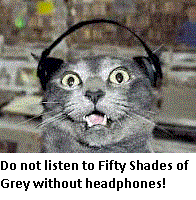 About a year ago, I wrote about media-enriched prose as a contrived method of storytelling, and I mentioned audiobooks. This is the follow-up, a year late because my day job has so little regard for my free time. Stop judging me.
About a year ago, I wrote about media-enriched prose as a contrived method of storytelling, and I mentioned audiobooks. This is the follow-up, a year late because my day job has so little regard for my free time. Stop judging me.
If the audiobook sub-industry is a barometer for success in the digital age, then things are certainly looking good for the modern writer. Audiobook publications rose from roughly 3,000 releases in 2007 to more than 20,000 in 2013, and a huge percentage of that growth occurred in the last three years alone. Audiobooks currently account for roughly 10% of all industry sales – a figure that’s expected to climb past 20% in the next five years. There are a number of factors driving audiobook sales, and I would be reticent if I didn’t mention Audible. As unfriendly as Amazon is to writers, I find it remarkably difficult to decouple their services from my life. You can cancel my audible account when I’m dead. Founded in 1998, Audible surfed the digital revolution and found that MP3 audiobooks were more than a niche market. When Amazon purchased the company in 2008, it was a natural marriage that tied Jeff Bezos’s e-publishing vision together (until the kindle paperwhite killed the ability to play MP3s, and consequently play audiobooks). Fortunately, Amazon’s approach is mostly hands-off. Audible still maintains a distinctly separate site with their own marketplace that has direct links to Amazon content.
What Audible has done for the audiobook revolution should not be overlooked – the ability to track favorite narrator as well as favorite authors can introduce writers to a whole new audience. And, conversely, stilted reading that resembles Ben Stein’s monotone soliloquy from Ferris Bueller’s Day Off can kill enthusiasm for fiction. I absolutely loved Rendezvous with Rama, but I could barely get through the audiobook because the performance was suicide-inducingly bad.
The Netflix revolution has inundated society with content. When it becomes possible to watch seven seasons of How I Met Your Mother in one sitting, only to find out the mother was the least important aspect of the show, finding readers willing to invest hours into your work is a tough sell. Audiobooks are not only a brilliant way to spend long car rides, they’re a great way to broaden your readership, and it’s never been easier to self-publish an audiobook. Though you shouldn’t expect any sales elves to shower you with gold. Royalty rates for self-publishing audiobooks are just as dismal as e-books. It’s also worth noting that audiobook contests are taking off, so team up with a rising voice actor today! Ron McLarty had a successful career as an audiobook narrator, which he leveraged into self-publishing The Memory Of Running as an audiobook. Once Stephen King mentioned it, McLarty’s sales skyrocketed.
If you’re writing, you should be reading. Audiobooks are a great way to fill the gap in your reading schedule. I regularly burn through 60 and 70 hour work weeks, which doesn’t leave much time for writing or reading. I keep up with my backlog by sneaking audiobooks in the car (40-minutes a day to and from work means I can churn through a book in about two months), listening to them at night (I’d rather fall asleep to a good audiobook than re-runs of How I Met Your Mother – just don’t listen to Stephen King unless you like creepy dreams), and listening while I’m doing things around the house. I will forever equate NOS4A2 with parmesan-encrusted shrimp.
But you’re not there yet, you say? You’re still working on that ending where your protagonist delivers a 40-page rousing speech? Well, you are reading your work out loud, right? If so, you’ve already realized that a 40-page speech doesn’t work. I’m not even sure why you brought it up.